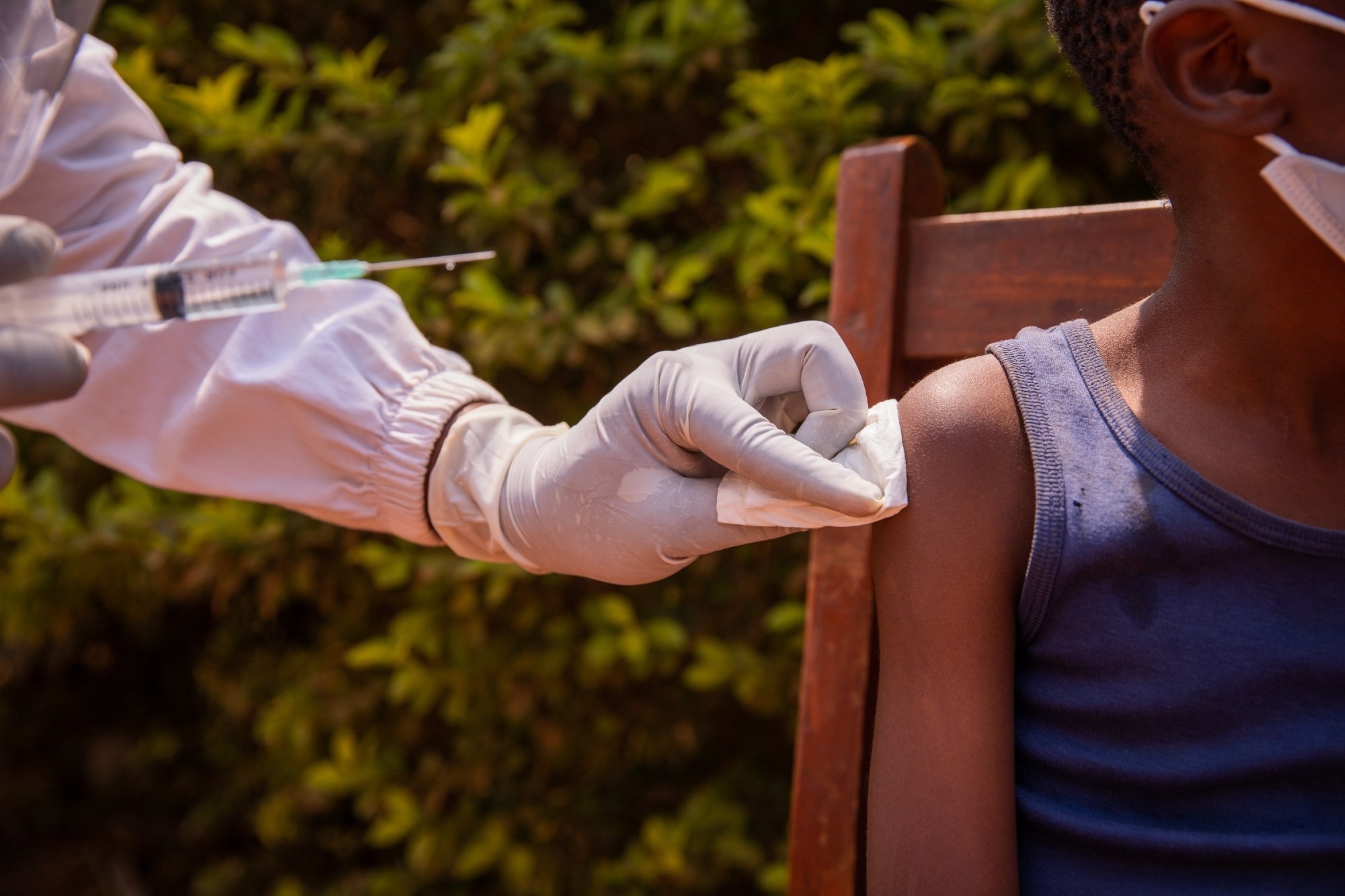They identified health system-related risks that could hinder malaria vaccine effectiveness and proposed solutions to ensure equitable and universal protection against the disease.
 Study: Malaria vaccination: hurdles to reach high-risk children. Image Credit: Media Lens King/Shutterstock.com
Study: Malaria vaccination: hurdles to reach high-risk children. Image Credit: Media Lens King/Shutterstock.com
Background
Despite decades of efforts, malaria remains a significant health challenge in Africa, prompting the introduction of RTS,S/AS01, and R21/Matrix-M vaccines.
These vaccines offer promising advancements but require further investment in research, development, and delivery strategies to maximize their impact.
Researchers in the present article examined the health system-related risks that could hinder universal malaria immunization, focusing on limited government health financing, vaccine allocation frameworks, and core issues in maximizing impact. The analysis builds upon existing research while delving into policy implications.
Limited government health financing
Limited public health financing in most African countries hampers their ability to purchase malaria vaccines in quantities sufficient to cover at-risk children. The number needed to vaccinate (NNV) can be calculated based on vaccine effectiveness (VE) and malaria incidence among unvaccinated children.
Vaccine wastage (VW) rates must also be considered, which increase with geographical and developmental distance from urban centers.
The financial investment required to purchase vaccines can overwhelm most countries' health systems, necessitating reliance on development partners.
As per the eligibility criteria determined by the Global Alliance for Vaccines and Immunization (Gavi), only 12 African countries have been approved for priority vaccine allocation, covering a small fraction of the at-risk population.
The introduction of the more cost-effective R21 vaccine may improve supply, but transformative changes in health financing are needed to ensure widespread accessibility.
Delivery costs pose another barrier, with additional costs per dose needed for administration. Achieving universal coverage would require substantial financial investment, highlighting the challenge of sustaining vaccination efforts without adequate funding.
Effective planning, funding, and coordination, supported by sustainable health financing models, are essential to maximize the public health impact of malaria vaccines.
Strengthening vaccine allocation frameworks
The World Health Organization devised a framework for selecting high-risk areas eligible for Gavi support based on malaria burden and child mortality rates at the district level.
However, this approach has limitations, relying on outdated data and neglecting emerging issues like antimicrobial resistance (AMDR).
AMDR, particularly concerning antimalarial drugs, affects malaria control strategies and requires consideration in vaccine prioritization. Current methods overlook dynamic epidemiological trends, hindering accurate needs assessment.
Updating the prioritization index with recent and comprehensive data is crucial to address these shortcomings. Incorporating AMDR indicators alongside traditional metrics can enhance the accuracy of vaccine allocation.
Additionally, establishing subnational scoring systems within eligible countries can prioritize districts based on vulnerability and equity considerations.
These frameworks ensure that vaccines reach the most at-risk children within countries, combating corruption and inequities that often hinder resource distribution.
Implementing these strategies requires robust data systems and stakeholder engagement to monitor and evaluate vaccine distribution effectively.
By prioritizing high-risk areas and addressing systemic barriers, malaria vaccines can maximize their impact on child health protection and contribute to achieving sustainable development goals (SDGs).
Without such measures, vaccines risk perpetuating inequalities, failing to reach the most vulnerable populations. Thus, proactive planning and targeted interventions at both national and subnational levels are essential.
Tackling core issues
Immunization efforts against malaria in Africa face challenges similar to those that have hindered routine immunization programs on the continent. Despite continued efforts, progress in routine immunization remains below international standards, with many countries off-track from global targets.
Sub-Saharan Africa (SSA) shows the highest burden of unvaccinated and under-vaccinated children globally, highlighting systemic weaknesses in vaccination programs.
Limited vaccine supply, worsened by issues like vaccine wastage, infrastructure deficiencies, corruption, and mismanagement exacerbates these challenges.
Geographical barriers, including the time taken to travel to healthcare facilities, impede access to routine immunization services, particularly in remote areas.
Additionally, a lack of investment in sustainable data systems limits evidence-based decision-making and hampers progress in disease control. Without effective data utilization, the root causes of public health inefficiencies remain unaddressed, hindering efforts to combat diseases like malaria.
Compliance with healthcare financing commitments like the Abuja Declaration and institutional strengthening are essential steps toward overcoming systemic challenges.
Merely integrating malaria vaccines into existing Expanded Program on Immunization (EPI) frameworks without fundamental changes in health systems may not yield the desired results. Transformative change integrated within immunization efforts is required to maximize their impact on African child health.
Conclusion
To effectively combat malaria, lessons from past immunization efforts must inform the deployment of malaria vaccines. A comprehensive assessment program is crucial prior to rollout to identify and address specific challenges.
By urgently addressing these risks and implementing tailored strategies, the potential of malaria vaccines to contribute to disease control and elimination can be realized.